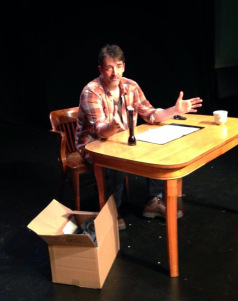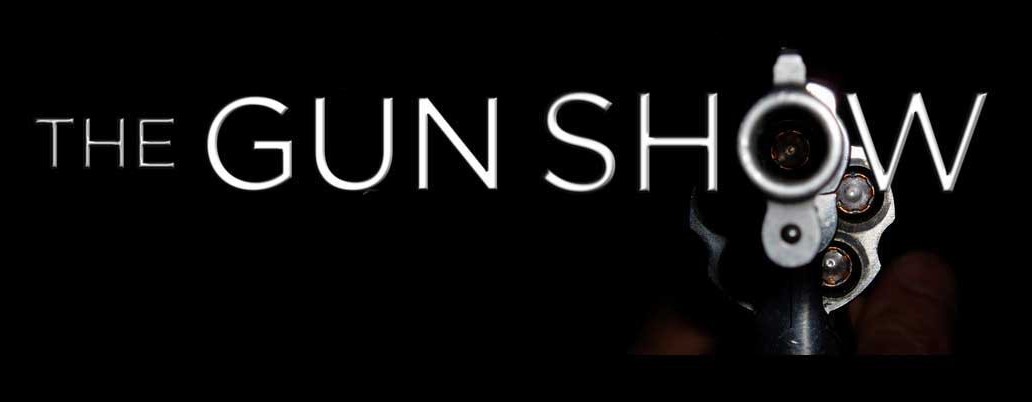Excerpted from NealsPaper with kind permission.
E.M. Lewis knows guns.
She grew up in rural Oregon, 50 miles from the nearest police station and a considerable distance from the nearest neighbor. Guns were a staple of the Lewis home. In her autobiographical play, THE GUN SHOW, Lewis has her alter ego, Ellen (played by a man, Trent Blanton) tell us three loaded shotguns rested all the time against a kitchen wall of their farmhouse, and if an unknown vehicle pulled in the family driveway, one of the family would point a gun at the visitor until it was ascertained he or she meant no harm. Hunting, target practice, shooting competitions, and other gun activities were an integral part of growing up where she did as she did.
In THE GUN SHOW, Lewis seeks to stimulate the debate on guns and gun ownership while offering tales that range from the matter-of-the-fact to the terrifying and sentimental. The stories are backed with research and statistics, and have you wavering in your ideas and allegiances throughout the course of the play. The statistics, usually percentages of calamity in a gun home vs, a home with no gun, provoke thought and reveal shades of gray about American gun policy. The show is paced with a rhythm that keeps you open to receiving information and ready to go one to the next dramatic encounter. Director Damon Bonetti shares prominently in the show’s success by creating a rich texture for the production and establishing a deft juxtaposition between the researched and the personal.

Bonetti keeps Blanton’s recitation real and direct. To begin, the actor sits at a table with a tabbed loose leaf binder in front of him, as if he’s going to read rather than act from memorization, and captures you with the simple act of saying he’s going to tell you five stories. There’s a “once upon a time” invitation to his approach. He compels you to listen.
The script stays on stage throughout THE GUN SHOW, and Bonetti puts it to use clever ways, to call attention to a situation or to create tension the way Alfred Hitchcock would use a McGuffin. (It dawns on me that Bonetti starred in The 39 Steps for Theatre Horizon and directed it for Hedgerow.) In one instance, Ellen is asked to dump the contents of a box on the stage so the audience can see them in entirety. As a director might expect an actor to do, Blanton lightly tips the box so that a light blue denim shirt we’ve seen previously falls out. Back at the table, the next page of the script reads in boldface capital letters, “No, dump the whole box. I mean it!” The moment is comic, but it’s also fraught with uneasiness because you expect a gun to be in the box, and you know what a revealed gun means in the theater.
Trent Blanton neutralizes the risk Lewis took when she decided to cast a man as Ellen. He looks rugged and rural in the unbuttoned red plaid flannel shirt he dons over a simple dark T-shirt and jeans. The effect is one of a person who is adept with firearms, in command of his life, and safe when it comes to anything involving a gun. Blanton does not attempt to feminize his character, even when she refers to herself in third person. He relates Lewis’s stories in an effective, affecting way. But a man telling about a robbery, a romance, or a suicide is different from the woman who lived through all of these things doing it. Blanton may be moving, but he, possibly at Bonetti’s behest, is not sentimental. You feel the impact of what he’s saying about a man who knows and can be trusted around guns, but the story is not as heartbreaking or gutcrunching as it may have been if a woman told it.
Still, Lewis has accomplished two simultaneous intentions—to tell a story theatrically and to spur perspective on guns and what official policy should be concerning them. THE GUN SHOW is a rare example of political theater that gets its intellectual mission accomplished while keeping its dramatic and theatrical values high. Read the full review on NealsPaper. [Passage Theatre Company at the Mill Hill Playhouse, 205 E. Front Street, Trenton, NJ] January 22-February 8, 2015; passagetheatre.org.

